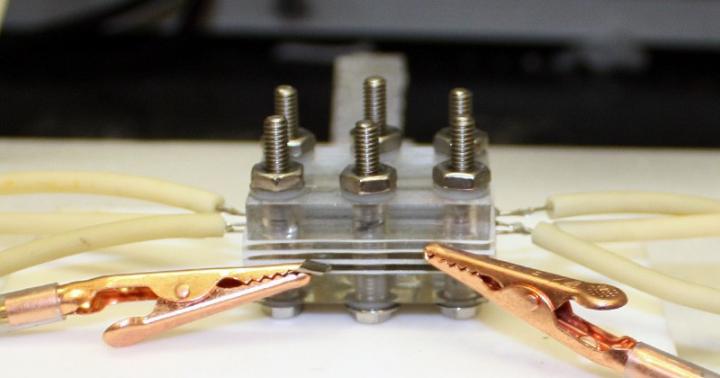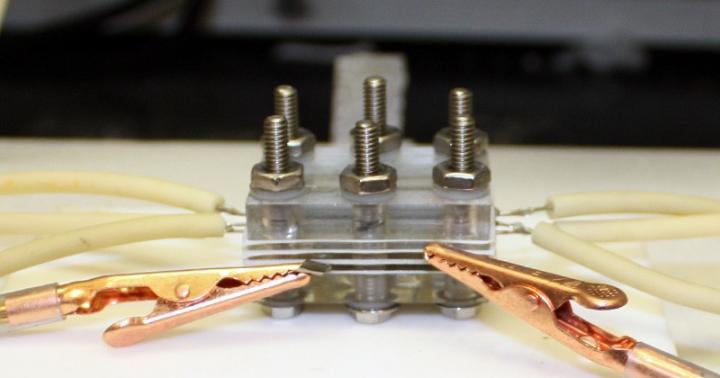
Credit: Feng Jiao
A team of researchers at the University of Delaware's Center for Catalytic Science and Technology (CCST) has discovered a novel two-step process to increase the efficiency of carbon dioxide (CO2) electrolysis, a chemical reaction driven by electrical currents that can aid in the production of valuable chemicals and fuels.
The results of the team's study were published Monday, Aug. 20 in Nature Catalysis.
The research team, consisting of Feng Jiao, associate professor of chemical and biomolecular engineering, and graduate students Matthew Jouny and Wesley Luc, obtained their results by constructing a specialized three-chambered device called an electrolyser, which uses electricity to reduce CO2 into smaller molecules.
Compared to fossil fuels, electricity is a much more affordable and environmentally-friendly method for driving chemical processes to produce commercial chemicals and fuels. These can include ethylene, which is used in the production of plastics, and ethanol, a valuable fuel additive.
"This novel electrolysis technology provides a new route to achieve higher selectivities at incredible reaction rates, which is a major step towards commercial applications," said Jiao, who also serves as associate director of CCST.
Whereas direct CO2 electrolysis is the standard method for reducing carbon dioxide, Jiao's team broke the electrolysis process into two steps, reducing CO2 into carbon monoxide (CO) and then reducing the CO further into multi-carbon (C2+) products. This two-part approach, said Jiao, presents multiple advantages over the standard method.
"By breaking the process into two steps, we've obtained a much higher selectivity towards multi-carbon products than in direct electrolysis," Jiao said. "The sequential reaction strategy could open up new ways to design more efficient processes for CO2 utilization."
Electrolysis is also driving Jiao's research with colleague Bingjun Xu, assistant professor of chemical and biomolecular engineering. In collaboration with researchers at Tianjin University in China, Jiao and Xu are designing a system that could reduce greenhouse gas emissions by using carbon-neutral solar electricity.
"We hope this work will bring more attention to this promising technology for further research and development," Jiao said. "There are many technical challenges still be solved, but we are working on them!"
###
This work was supported with a grant from the U.S. Department of Energy's Office of Fossil Energy and an award from the National Science Foundation Faculty Early Career Development Program.
About CCST
Established in 1978, the Center for Catalytic Science and Technology has pioneered multidisciplinary research in the scientific and engineering principles of catalysis. CCST has forged a strong tie to industrial practice, supported through grant and contract research, collaborative projects with industrial scientists and engineers, and industrial sabbaticals and exchanges of research personnel. Additionally, the Center's laboratories and wide range of research instrumentation represent one of the foremost facilities for catalysis research in academia.
Media Contact
Peter Kerwin
[email protected]
302-831-8749
@UDResearch
http://www.udel.edu
Original Source
https://www.udel.edu/udaily/2018/august/feng-jiao-carbon-conversion-nature-catalysis/ http://dx.doi.org/10.1038/s41929-018-0133-2





